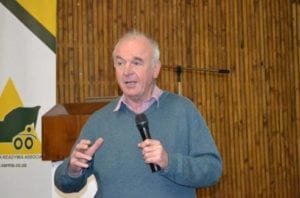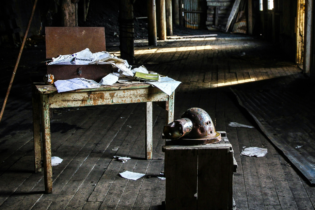Conference 2013: A tangible difference
The South African Ready Mix Association (SARMA) held its 2013 annual conference outside the city limits this year, in a rustic conference venue near the Hartbeespoort Dam. The two-day event was very well attended and stood out for its excellent selection of speakers and well-thought-out programme. The conference opened with possibly the most energetic and compelling public speakers on the circuit these days, Vusi Thembekwayo. His ability to reach out and touch his audience was simply astounding, and set the stage for an engaging couple of days. SARMA’sgeneral manager, Johan van Wyk, bravely took to the podium, following the storm of energy that preceded him, and successfully brought the audiences’ attention to the material issues facing the industry. No small feat. Noting that SARMA is entering a new era, beyond the world of standards and regulatory matters, van Wyk stressed the importance of promotingreadymix and representing the interests of both its members and the end-user. “A lot has happened in the last few years and our construction industry has gone from riches to rags and back too many times to remember. As a result, the rulebook has changed and so we need to look at the future role of readymix concrete from both an end-user perspective, as well as from producers and suppliers perspectives,” noted Van Wyk. Member companies were encouraged to register staff representing all levels of the readymix supply chain, in order to learn more about their challenges and broaden the association’sunderstanding of all levels of challenges and needs. Training, safety and standards This was followed by a panel discussionwhich focused on the many roles of SARMA and where it might have more to offer. On the training side of things, it was clear that are many levels of education that need to be considered in the industry. This ranged from helping smaller member companies become more business savvy– in the use of technologies – and business management(including accounting, debt collection and staffing issues), all the way to on-site training. This latter being essential in reducing the amount insurance and/or litigation claims occurring due to lack of knowledge, poor techniques and other simple errors that can lead major problems down the line. Regarding the role SARMA as being the mouthpiece of the industry, it became clear that SARMA members and the organisation itself needed to learn to communicate better. Members acknowledged unanimously that their SARMA membership often assured clients and contributed to getting ongoing business. When it came to standards, audits and training, the association play an intrinsic role at the centre of this trade. Working with the public sector An interesting comment was given by a member of the Cement Institute, and this was that a multi-representative body across the construction industry to work with government in achieving the goals set in the National Development Plan could go a long way to developing a more integrated and efficient rollout of infrastructure. There is also a need for trainers who are able to go out and give seminars in rural areas. The focus then moved back to marketing – this time directly to consumers and a clear strategy will be put in place on how to build readymix as a household name.Safety in the work place and on the roads
When it came to quality and auditing, SARMA confirmed that it does – and will continue to- perform spot checks. This includes checks on safety, quality and standards. Perhaps one of the most critical concerns mentionedat the conference was driver and traffic safety. The readymix industry depends on specialist trucks for transport of product, and the level of accidents on the South African roads demands a new level of safety awareness from business and the public alike. One interesting idea raised was to adopt the American practise of holding a national Drivers Safety Competition. With readymix trucks being among the most dangerous on the roads, this initiative would bring positive attention to the industry while giving its drivers a feeling of inclusion in the association and something to strive for. This would be a contribution not just to the industry itself, but to South African society as whole. Ending with the future The closing speaker was none other than Clem Sunter, known for his ‘Mind of the fox’ theme, which he tailored with his usual cunning to the audience. The concept of probabilities and scenarios has gained worldwide attention, especially as it pre-empted some of the most significant occurrences of our age, including 9/11 and the collapse of the sub-prime market. Sunter amusingly explained why this concept would have originated in Africa instead of a developed nation: developed nations think they are in control, whereas Africans know they are not in control. The ability to adjust to ever-changing scenarios is a hallmark of human survival, and so it is for business as well. Keep evolving According to Sunter, most business games actually change every five to ten years. The more successful a company is in one game, the blinder it may beto the changes going on around them. He suggestedSouth Africa need another CODESA, but this time, one focused squarely on the economy. Major concerns include the violent nature of our strikes, the growing inequality between rich and poor, the country’s decline in competitiveness, the potential negative impact on the private healthcare sector that a poorly managed roll-out of the National Health System could bring, the secrecy bill, lack of support for entrepreneurs, the threat of land grabs and nationalisation of the mining sector, and ineffective leadership. The list is extensive, but far from conclusive. Each threat has several possible responses and the key to solving the country’s issues is participation. Leaders in both the public and the private sector need to become brutally honest about these threats and work out clearly what is driving them. Themes and resolutions As an organisation, SARMA itself has entered a phase of change and evolution. The appointment of Johan van Wyk represents a renewed commitment to its members and the industry, as well the industries it works alongside. “The industry is in a stateofchange with new requirements and new expectations surfacing on a constant basis,” says van Wyk. “This year’s conference…ushered in a new era for SARMA, as we broaden our focus from mainly influencing standards and regulatory matters, to further focus on promoting the use of readymix and engaging all stakeholders (including endusers) to redefine requirements in a changed environment.” The conference was extremely well thought out and attention was well focused in the relevant areas. SARMA’s message was on point in our changing society, and it has invested incredibly well in meaningful areas, including staff, media and tangible value for its members.





